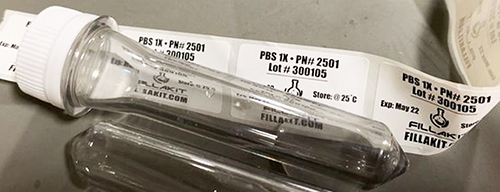The fledgling test-kit company sent plastic preforms that were intended for use in the manufacturing of soda bottles, not clinical laboratory specimen tubes
When is a specimen tube not a specimen tube? When it is a plastic tube made for creating soda bottles. And that may be exactly what the Federal Emergency Management Agency (FEMA) received after paying $7.3 million to a fledgling Florida-based company that won a multi-million-dollar no-bid contract from the federal government for COVID-19 clinical laboratory testing supplies, which FEMA then shipped nationwide to states that had requested the supplies.
FEMA signed the deal with Fillakit, LLC, on May 7, 2020, “just six days after the company was formed,” reported ProPublica, which went on to state that the shipment of unusable Fillakit specimen tubes contributed to delays in rolling out widespread COVID-19 testing in the US.
According to ProPublica, Fillakit supplied “preforms” that are designed to be expanded with heat and pressure into 2-liter soda bottles, not laboratory specimen tubes.
Michelle Forman, a spokesperson for the Association of Public Health Laboratories, told ProPublica one major flaw of the Fillakit tubes is their size. “They are an unusual shape, so they don’t fit racks,” she said, “and we are getting lots of pushback about how difficult it is to work with them from our clinical partners.”

Fillakit Employees Describe ‘Unsanitary’ Working Conditions
Ex-employees of Fillakit told the Wall Street Journal (WSJ) the specimen tubes were being handled in unsanitary open-air conditions in a warehouse outside of Houston where the test kits were being assembled.
“There were up to 250 workers crowded in a small warehouse room, shoulder to shoulder … working off of fold-up tables with supplies placed on the floor and handled without gloves,” Teresa Bosworth Green told Community Impact (CI), which reported that Green worked at Fillakit from May 11-20.
“We were told that we would be filling and capping tubes that would be used for COVID testing,” Green told CI.
However, according to CI, Green “expressed concern about the lack of cleanliness and facemasks. Green brought her own mask, but workers were not initially provided any.”
Green told CI, “People were breathing and coughing right over the solution.”
In a letter to FEMA and the Department of Health and Human Services (HHS) after Michigan received more than 322,000 tubes of transport media manufactured by Fillakit, Democrat Senators Debbie Stabenow and Gary Peters wrote, “Even if the tubes themselves were not unsuitable for testing purposes, the contamination risks inherent in such careless handling would cause serious concerns about the reliability of any tests conducted using these materials.”
On July 7, 2020, the Wall Street Journal reported that Fillakit had notified the Florida Secretary of State on June 26 that the company had been dissolved.

Under Pressure, Feds Award Contracts for COVID-19 Test Supplies to Inexperienced Suppliers
Fillakit as just one example out of “more than 250 companies that got contracts worth more than $1 million without going through a fully competitive bidding process,” NPR reported.
“Government procurement experts say federal officials were trying to move quickly to deliver desperately needed personal protective equipment,” NPR continued. “But they question the need to turn to contractors who have never worked with the government before and lacked experience making or delivering the protective gear.”
Among those receiving contracts were companies with little to no experience in manufacturing clinical laboratory testing supplies, personal protective equipment (PPE), as well as others that had never worked in the medical field. One company imported vodka, while another was a school security consultant. Many of the contractors served as middlemen, securing PPE from Chinese manufacturers, which meant they often were “competing with federal agencies, state governments, and local health systems,” all of which were attempting to buy the same equipment in the global marketplace, NPR reported.
“Giving business to people who don’t have experience is something you don’t want to do in an emergency,” Joshua Schwartz, JD, a professor of Government Contracts Law and co-director of the Government Procurement Law Program at George Washington University School of Law, told NPR.
FEMA Defends Its Contracting Process
A ProPublica analysis of coronavirus contracts found that about 13% of total federal government pandemic spending went to first-time vendors. And in a follow-up article, ProPublica claimed, “many of the new contractors have no experience acquiring medical products.”
FEMA, however, maintains it pays for purchases only after they have been delivered to minimize potential for waste of taxpayer dollars. “FEMA does not enter into contracts unless it has reason to believe they will be successfully executed,” the agency told ProPublica.
The US’ lack of preparedness for the COVID-19 pandemic has resulted in missteps and misspending as federal agencies struggle to provide hospitals, clinical laboratories, and healthcare providers with personal protective gear and test supplies, and to ramp up COVID-19 testing nationwide.
This is yet another instance where federal agencies appear to lack the competencies required to fulfill healthcare requirements with proven products that meet critical specifications. Meanwhile, in every community throughout the United States, independent medical laboratories and hospital-based laboratories are clamoring for adequate supplies of everything from collect swabs and viral transport media to reagents and cuvettes.
—Andrea Downing Peck
Related Information:
The Trump Administration Paid Millions for Test Tubes and Got Unusable Mini Soda Bottles
Conroe-Based Company Made Unusable COVID-19 Test Supplies Using $10-Million FEMA Grant
Covid-19 Test-Tube Firm Awarded U.S. Contract, Is Accused of Unsanitary Workplace
Coronavirus Test-Kit Maker Dissolves Amid Probes
Feds Spend Billions on COVID-19 Contracts, Often without Fully Competitive Bidding
FEMA: Federal Support to Expand National Testing Capabilities
Instead of Coronavirus Testing Supplies, FEMA Sent 300K Tiny Soda Bottles to Washington



